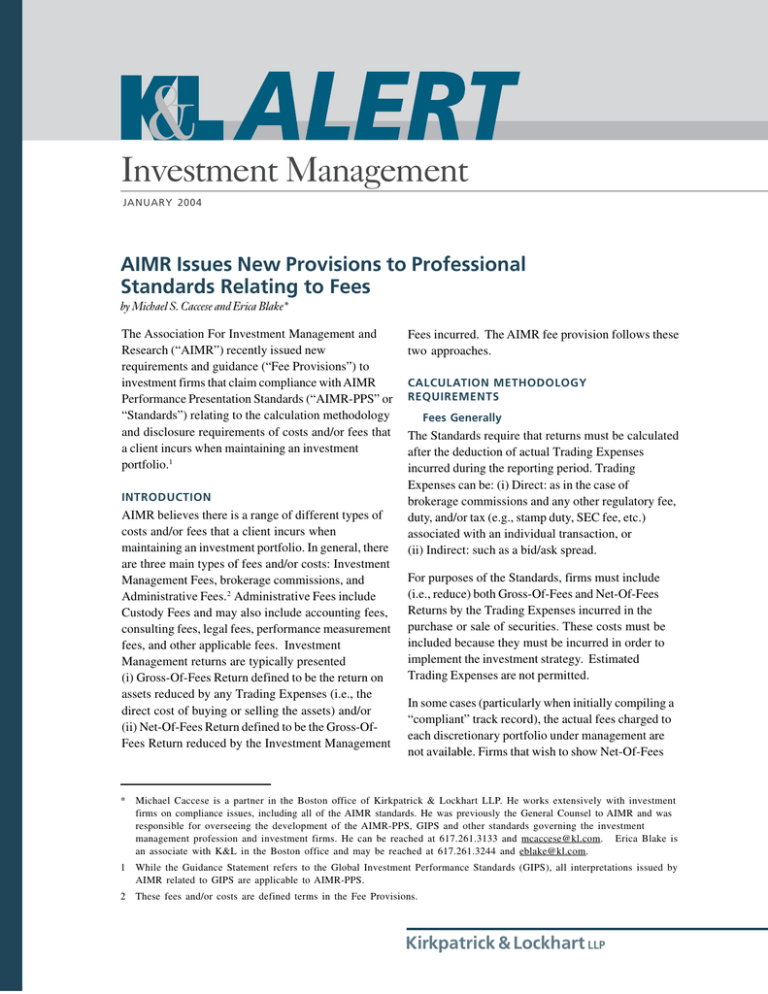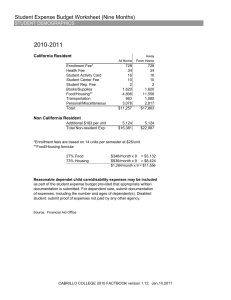
Investment Management
JANUARY 2004
AIMR Issues New Provisions to Professional
Standards Relating to Fees
by Michael S. Caccese and Erica Blake*
The Association For Investment Management and
Research (“AIMR”) recently issued new
requirements and guidance (“Fee Provisions”) to
investment firms that claim compliance with AIMR
Performance Presentation Standards (“AIMR-PPS” or
“Standards”) relating to the calculation methodology
and disclosure requirements of costs and/or fees that
a client incurs when maintaining an investment
portfolio.1
INTRODUCTION
AIMR believes there is a range of different types of
costs and/or fees that a client incurs when
maintaining an investment portfolio. In general, there
are three main types of fees and/or costs: Investment
Management Fees, brokerage commissions, and
Administrative Fees.2 Administrative Fees include
Custody Fees and may also include accounting fees,
consulting fees, legal fees, performance measurement
fees, and other applicable fees. Investment
Management returns are typically presented
(i) Gross-Of-Fees Return defined to be the return on
assets reduced by any Trading Expenses (i.e., the
direct cost of buying or selling the assets) and/or
(ii) Net-Of-Fees Return defined to be the Gross-OfFees Return reduced by the Investment Management
Fees incurred. The AIMR fee provision follows these
two approaches.
CALCULATION METHODOLOGY
REQUIREMENTS
Fees Generally
The Standards require that returns must be calculated
after the deduction of actual Trading Expenses
incurred during the reporting period. Trading
Expenses can be: (i) Direct: as in the case of
brokerage commissions and any other regulatory fee,
duty, and/or tax (e.g., stamp duty, SEC fee, etc.)
associated with an individual transaction, or
(ii) Indirect: such as a bid/ask spread.
For purposes of the Standards, firms must include
(i.e., reduce) both Gross-Of-Fees and Net-Of-Fees
Returns by the Trading Expenses incurred in the
purchase or sale of securities. These costs must be
included because they must be incurred in order to
implement the investment strategy. Estimated
Trading Expenses are not permitted.
In some cases (particularly when initially compiling a
“compliant” track record), the actual fees charged to
each discretionary portfolio under management are
not available. Firms that wish to show Net-Of-Fees
*
Michael Caccese is a partner in the Boston office of Kirkpatrick & Lockhart LLP. He works extensively with investment
firms on compliance issues, including all of the AIMR standards. He was previously the General Counsel to AIMR and was
responsible for overseeing the development of the AIMR-PPS, GIPS and other standards governing the investment
management profession and investment firms. He can be reached at 617.261.3133 and mcaccese@kl.com. Erica Blake is
an associate with K&L in the Boston office and may be reached at 617.261.3244 and eblake@kl.com.
1
While the Guidance Statement refers to the Global Investment Performance Standards (GIPS), all interpretations issued by
AIMR related to GIPS are applicable to AIMR-PPS.
2
These fees and/or costs are defined terms in the Fee Provisions.
Kirkpatrick & Lockhart LLP
performance results are permitted to use the highest
Investment Management Fee incurred by portfolios
in the composite to reduce Gross-Of-Fees
performance. However, firms are prohibited from
using the highest Investment Management Fee to
add to the Net-Of-Fees Return in order to obtain a
Gross-Of-Fees Return. Adding back the highest fee
would result in overstating the Gross-Of-Fees Return.
When adjusting from Net-Of-Fees to Gross-Of-Fees
performance, firms must use either the actual
investment management fees or the weightedaverage investment management fee for the
composite.
DISCLOSURE REQUIREMENTS
Bundled Fees
A bundled fee is a combination of several fees to
create a one “Bundled Fee”. A Bundled Fee can
include any combination of fees including Trading
Expenses, Investment Management Fees, Custody
Fees, or any other related fees. A Bundled Fee can be
specific to a client, as is the case with “all-in” fees, or
can be specific to a particular product, as is the case
with “wrap” fees.
If a firm includes a portfolio with a Bundled Fee in a
composite, it must disclose that the composite
contains portfolios with Bundled Fees and disclose
the percentage of composite assets that are Bundled
Fee portfolios. Firms are required to disclose the
various types of fees that are included in the Bundled
Fee.
Some Bundled Fees can be segregated into the
various underlying components (e.g., the firm can
“unbundle” the fee and identify each segment that
comprises the Bundled Fee). In other cases, only
portions of the Bundled Fee can be segregated
(e.g., Investment Management Fee segment can be
identified and separated, but the Custody and
Trading Expenses cannot).
In cases where the Trading Expenses cannot be
identified and segregated from a Bundled Fee, either
the entire Bundled Fee, or the portion of the Bundled
Fee containing the Trading Expenses, must be
included in (i.e., reduce) the Gross-Of-Fees and NetOf-Fees Returns. In these cases, Custody and other
Administrative Fees might be included in the GrossOf-Fees and Net-Of-Fees Returns. Firms may also
find that when the components of the Bundled Fee
cannot be identified that the Gross-Of-Fees Return is
equal to the Net-Of-Fees Return.
In order to assist prospective clients in better
understanding the fees included in the Gross-Of-Fees
Return calculation, firms must disclose if other fees
are included in the Bundled Fee in addition to the
Trading Expenses. When presenting Net-Of-Fees
Returns, firms must disclose if other fees are included
in addition to the Investment Management Fee and
Trading Expenses.
Some investment product returns such as mutual
funds are typically calculated net of other fees
(e.g., Custody and other Administrative Fees).
In order for these products to be treated consistently
with regards to the definitions of Gross-Of-Fees and
Net-Of-Fees in the Standards, firms are allowed to
add back all fees and expenses (e.g., Investment
Management, Custody, transfer agent, share
registration, marketing, and regulatory fees) except
for Trading Expenses. When calculating Net-Of-Fees
Returns, firms are allowed to add back all fees and
expenses except for Trading Expenses and the
Investment Management Fee, provided that the firm
can identify all these fees. Estimated fees are not
permitted.
Additional Fees: Sub-Advisor, Pooled Funds
and Fund-of-Funds
Firms may invest a portion of a larger portfolio in a
pooled fund, utilize a subadvisor, or create a fund-offunds structure whereby they incur additional fees
charged by the underlying fund or paid to the subadvisor. In these situations, firms must present the
Net-Of-Fees performance net of Transaction
Expenses and Investment Management Fees,
(including the underlying fees). AIMR is silent on
how to calculate gross of fee performance. However,
it would appear appropriate to add both the
underlying investment management along with the
firm’s investment management fee.
In all cases, the firm must disclose in each composite
presentation the current Fee Schedule appropriate to
the particular composite.
EFFECTIVE DATE
The Fee Provisions can be found on AIMR’s website
at www.aimr.org/standards. The effective date of the
Fee Provisions is January 1, 2005. No retroactive
compliance is recommended or mandated.
Kirkpatrick & Lockhart LLP
2
Kirkpatrick & Lockhart LLP maintains one of the leading investment management practices in the United States,
with more than 60 lawyers devoting all or a substantial portion of their practice to this area and its related
specialties. The American Lawyer Corporate Scorecard, published in April 2003, lists K&L as a primary legal
counsel to the investment companies, board members or advisory firms for 15 of the 25 largest mutual fund
complexes. No law firm was mentioned more frequently in the Scorecard.
We represent mutual funds, closed-end funds, insurance companies, broker-dealers, investment advisers, retirement
plans, banks and trust companies, hedge funds, offshore funds and other financial institutions. We also regularly
represent mutual fund distributors, independent directors of investment companies and service providers to the
investment management industry. In addition, we frequently serve as outside counsel to industry associations on a
variety of projects, including legislative and policy matters.
We work with clients in connection with the full range of investment company industry products and activities,
including all types of open-end and closed-end investment companies, funds of hedge funds, variable insurance
products, private and offshore investment funds and unit investment trusts. Our practice involves all aspects of
the investment company business.
We invite you to contact one of the members of the practice, listed below, for additional assistance. You may also
visit our website at www.kl.com for more information, or send general inquiries via email to
investmentmanagement@kl.com.
BOSTON
Michael S. Caccese
Philip J. Fina
Mark P. Goshko
Thomas Hickey III
Nicholas S. Hodge
617.261.3133
617.261.3156
617.261.3163
617.261.3208
617.261.3210
mcaccese@kl.com
pfina@kl.com
mgoshko@kl.com
thickey@kl.com
nhodge@kl.com
LOS ANGELES
William P. Wade
310.552.5071
wwade@kl.com
NEW YORK
Philip L. Kirstein
Beth R. Kramer
Richard D. Marshall
Robert M. McLaughlin
Loren Schechter
212.536.483
212.536.4024
212.536.3941
212.536.3924
212.536.4008
pkirstein@kl.com
bkramer@kl.com
rmarshall@kl.com
rmclaughlin@kl.com
lschechter@kl.com
SAN FRANCISCO
Eilleen M. Clavere
Jonathan D. Joseph
David Mishel
Mark D. Perlow
Richard M. Phillips
415.249.1047
415.249.1012
415.249.1015
415.249.1070
415.249.1010
eclavere@kl.com
jjoseph@kl.com
dmishel@kl.com
mperlow@kl.com
rphillips@kl.com
WASHINGTON
Clifford J. Alexander
Diane E. Ambler
Catherine S. Bardsley
Arthur J. Brown
Arthur C. Delibert
Robert C. Hacker
Benjamin J. Haskin
Kathy Kresch Ingber
Rebecca H. Laird
Thomas M. Leahey
Cary J. Meer
R. Charles Miller
Dean E. Miller
R. Darrell Mounts
C. Dirk Peterson
David Pickle
Alan C. Porter
Theodore L. Press
Robert H. Rosenblum
William A. Schmidt
Lynn A. Schweinfurth
Donald W. Smith
Martin D. Teckler
Robert A. Wittie
Robert J. Zutz
202.778.9068
202.778.9886
202.778.9289
202.778.9046
202.778.9042
202.778.9016
202.778.9369
202.778.9015
202.778.9038
202.778.9082
202.778.9107
202.778.9372
202.778.9371
202.778.9298
202.778.9324
202.778.9887
202.778.9186
202.778.9025
202.778.9464
202.778.9373
202.778.9876
202.778.9079
202.778.9890
202.778.9066
202.778.9059
calexander@kl.com
dambler@kl.com
cbardsley@kl.com
abrown@kl.com
adelibert@kl.com
rhacker@kl.com
bhaskin@kl.com
kingber@kl.com
rlaird@kl.com
tleahey@kl.com
cmeer@kl.com
cmiller@kl.com
dmiller@kl.com
dmounts@kl.com
dpeterson@kl.com
dpickle@kl.com
aporter@kl.com
tpress@kl.com
rrosenblum@kl.com
william.schmidt@kl.com
lschweinfurth@kl.com
dsmith@kl.com
mteckler@kl.com
rwittie@kl.com
rzutz@kl.com
Kirkpatrick & Lockhart LLP
Challenge us.
www.kl.com
BOSTON
DALLAS
HARRISBURG
LOS ANGELES
MIAMI
NEWARK
NEW YORK
PITTSBURGH
SAN FRANCISCO
WASHINGTON
............................................................................................................................................................
This publication/newsletter is for informational purposes and does not contain or convey legal advice. The information herein
should not be used or relied upon in regard to any particular facts or circumstances without first consulting a lawyer.
© 2004 KIRKPATRICK & LOCKHART LLP. ALL RIGHTS RESERVED.



